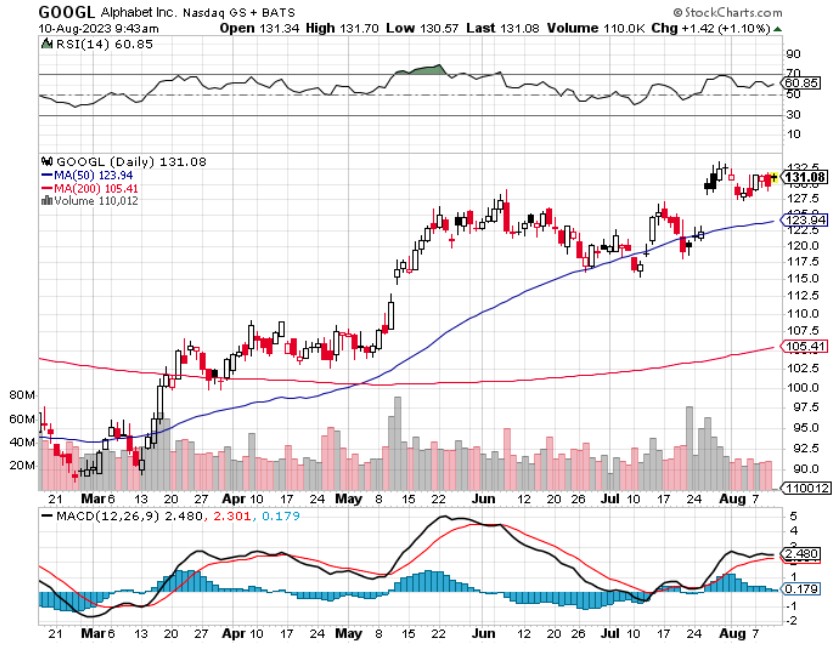CODING, CLOUD, AND COMPOSING: GOOGLE'S TRIPLE THREAT IN THE AI ARENA
(GOOGL), (UNVGY)
If the winds of technological advancement keep blowing as they are, 2023 could well be hailed as the year when AI didn't just softly announce its presence but resoundingly proclaimed its dominance. And one of the names at the forefront? Google, charging full-steam ahead after the whirlwind debut of ChatGPT last year.
Generative AI is turning heads not just by digesting data, but by producing intelligent content with seasoned flair. Picture a system drafting emails with unmatched precision, fixing computer glitches at lightning speed, and answering your complex queries in a heartbeat.
But this isn’t just a narrative of tech prowess. We're at the precipice of a monumental economic surge, with estimates ranging from $6 trillion to an ambitious $7 trillion, all by 2030.
Clearly, an AI-orchestrated future is not just a prospect, it's an imminent reality.
So, where does Alphabet (GOOGL), Google's parent company, stand amid all this?
First of all, erase any misconceptions about them missing the AI train. While they might have appeared a tad offbeat at ChatGPT's inception by OpenAI, Google has been meticulously crafting AI innovations for years.
Evidence? One could simply chat with Google's chatbot Bard, or marvel at how they've seamlessly infused machine learning into tools we use daily, like Search, Google Lens, and Google Translate. It's as if our everyday gadgets have been elevated to prodigious heights.
Then there's the impressive Google Cloud.
Far from just a floating concept in the virtual ether, it's an effulgent hub of innovation, becoming the go-to for businesses eager to harness the power of AI. Its recent 28% revenue growth in Q2 isn’t merely impressive; it’s a testament to the ongoing AI revolution.
Indeed, with Google Cloud's revenue overtaking YouTube ads, it's clear they're on an upward trajectory, powered by AI.
Digging deeper into Google's success, their search engine isn’t just leading—it’s reigning supreme with a formidable 93% market share. The reason? Their cutting-edge AI algorithms.
It's no exaggeration to say their system often knows what we seek even before we're sure of it. And it's this AI sophistication that's also revolutionizing digital advertising. By capturing nearly 30% of the global internet ad market, they're not just participating—they're setting the pace.
As we marvel at these advancements, Google has yet another ace up its sleeve: Project IDX.
This is not just another platform—it's a cutting-edge AI-backed browser workshop for creating state-of-the-art apps. What’s particularly savvy is how they've repurposed the tried-and-true Visual Studio Code, integrating it with their PaLM 2–based programming assistant, Codey. This combination transforms IDX into an intuitive coding companion, replete with smart code completion and AI-driven insights.
Shifting our lens to a slightly different pitch, there's another burgeoning field where Google is making waves—the music industry. They’re currently in advanced discussions with Universal Music Group (UNVGY) to license artist voices and melodies for AI-crafted music.
This venture aims to let users compose with the voices of stalwarts like Drake or Ariana Grande, blending the boundaries between fan and artist. With the right agreements in place, artists would get their due, and the world of music as we know it might be on the brink of a profound transformation.
As we stand at the cusp of an AI-driven era, Google is not just participating in the race—they're shaping the course. With their diverse AI applications, from search to cloud to music, it's evident that they're positioned not only to ride the AI wave but potentially to lead it.
For investors eyeing the AI realm, Google offers a promising, multifaceted avenue, showing once again that they're adept not just at predicting the future, but at creating it.


